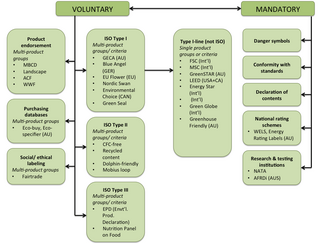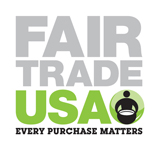
Fair trade is an arrangement designed to help producers in growing countries achieve sustainable and equitable trade relationships. The fair trade movement combines the payment of higher prices to exporters with improved social and environmental standards. The movement focuses in particular on commodities, or products that are typically exported from developing countries to developed countries, but is also used in domestic markets, most notably for handicrafts, coffee, cocoa, wine, sugar, fruit, flowers, and gold.
Ethical consumerism is a type of consumer activism based on the concept of dollar voting. People practice it by buying ethically made products that support small-scale manufacturers or local artisans and protect animals and the environment, while boycotting products that exploit children as workers, are tested on animals, or damage the environment.

The Fairtrade certification initiative was created to form a new method for economic trade. This method takes an ethical standpoint, and considers the producers first.

Ecolabels and Green Stickers are labeling systems for food and consumer products. The use of ecolabels is voluntary, whereas green stickers are mandated by law; for example, in North America major appliances and automobiles use Energy Star. They are a form of sustainability measurement directed at consumers, intended to make it easy to take environmental concerns into account when shopping. Some labels quantify pollution or energy consumption by way of index scores or units of measurement, while others assert compliance with a set of practices or minimum requirements for sustainability or reduction of harm to the environment. Many ecolabels are focused on minimising the negative ecological impacts of primary production or resource extraction in a given sector or commodity through a set of good practices that are captured in a sustainability standard. Through a verification process, usually referred to as "certification", a farm, forest, fishery, or mine can show that it complies with a standard and earn the right to sell its products as certified through the supply chain, often resulting in a consumer-facing ecolabel.

The Fair Trade Towns campaign is the result of a grass-roots citizens movement that started in the UK in 2001. It allows citizens to get together in order to self-proclaim their town as a region that complies with a few general Fair Trade criteria, that can be adapted from country to country but which retain their main elements.

The Fairtrade Foundation is a charity based in the United Kingdom that works to empower disadvantaged producers in developing countries by tackling injustice in conventional trade, in particular by promoting and licensing the Fairtrade Mark, a guarantee that products retailed in the UK have been produced in accordance with internationally agreed Fairtrade standards. The Foundation is the British member of FLO International, which unites FLO-CERT, 25 National Fairtrade Organisations and 3 Producer Networks across Europe, Asia, Latin America, North America, Africa, Australia and New Zealand.

The International Fairtrade Certification Mark is an independent certification mark used in over 50 countries. It appears on products as an independent guarantee that a product has been produced according to Fairtrade political standards.

Fair Trade USA, formerly "TransFair USA", is a 501(c)(3) non-profit organization that sets standards, certifies, and labels products that promote sustainable livelihoods for farmers and workers and protect the environment.

Fairtrade Canada, formerly TransFair Canada, is a national non-profit certification and public education organization promoting Fairtrade certified products in Canada to improve the livelihood of developing world farmers and workers. It is the Canadian member of FLO International, which unites 24 fair trade producer and certification initiatives across Europe, Asia, Latin America, North America, Africa, Australia and New Zealand.

Stichting Max Havelaar is the Dutch member of Fairtrade International, which unites 23 Fairtrade certification producer and labelling initiatives across Europe, Asia, Latin America, North America, Africa, Australia and New Zealand. Several of these corresponding organizations in other European countries also use the Max Havelaar name. The name comes from Max Havelaar, which is both the title and the main character of a Dutch 19th-century novel critical of Dutch colonialism in the Dutch East Indies.

The Fair Trade Association of Australia and New Zealand is a member-based organization that supports two systems of fair trade. The first is the Australia and New Zealand member of FLO International, which unites Fairtrade producer and labeling initiatives across Europe, Asia, Latin America, North America, Africa, Australia and New Zealand. The second, is the World Fair Trade Organization (WFTO), of over 450 worldwide members, to which the Fair Trade Association is one. Fairtrade refers to FLO certified commodity and associated products. Fair trade encompasses the wider Fair Trade movement, including the Fairtrade commodities and other artisan craft products.
The fair trade movement has undergone several important changes like the operation for ten thousand villages to open their businesses since early days following World War II. Fair trade, first seen as a form of charity advocated by religious organizations, has radically changed in structure, philosophy and approach. The past fifty years have witnessed massive changes in the diversity of fair trade proponents, the products traded and their distribution networks.
The fair trade debate concerns the ethics and economic implications of fair trade, and alleged issues with the Fairtrade brand in particular.

Fair trade coffee is coffee that is certified as having been produced to fair trade standards by fair trade organizations, which create trading partnerships that are based on dialogue, transparency and respect, with the goal of achieving greater equity in international trade. These partnerships contribute to sustainable development by offering better trading conditions to coffee bean farmers. Fair trade organizations support producers and sustainable environmental farming practices and prohibit child labor or forced labor.
Sustainable products are those products that provide environmental, social and economic benefits while protecting public health and environment over their whole life cycle, from the extraction of raw materials until the final disposal.

Fair trade cocoa is an agricultural product harvested from a cocoa tree using a certified process which is followed by cocoa farmers, buyers, and chocolate manufacturers, and is designed to create sustainable incomes for farmers and their families. Companies that use fair trade certified cocoa to create products can advertise that they are contributing to social, economic, and environmental sustainability in agriculture.
Fairtrade bananas was a marketing initiative which focused on increasing the price paid to small banana growers and the wages of agricultural workers. This is not a commercial brand, but a marketing strategy. Fair trade is based on higher prices paid by consumers that allow an equitable distribution of gains from trade over the chain partners.
An alternative purchase network (APN) is a contemporary commerce channel established as an alternative to perceived consumerism, and the cultural and economic hegemony of the global market. Alternative purchase networks aim to promote ethical shopping behaviour, which has an environmentally-friendly approach and considers local realities.
Fair trade is where a farmer or craftsperson is paid a fair price for their product, one that represents its true worth, not just the lowest price that it is possible to pay. This is a price that covers the cost of production and enables the producer to live with dignity. Fair Trade New Zealand is an organisation that was launched in 2005 which supports fair trade by ensuring that farmers and workers' rights are not exploited. According to Oxfam New Zealand, there are several companies to support fairly traded goods from, which are exported to New Zealand. From 2013-2014 there were 42 Fair Trade Licensees and Traders in New Zealand. From 2015-2016 this number rose to 54 Fair Trade Licensees and Traders in New Zealand. Gwen Green, Oxfam's Engagement Director, says: "when farmers are paid fairly for their products, we see people able to make real improvements to their lives and their communities. Producers who used to struggle to feed their families are able to give their children an education, and communities can build schools and develop businesses. It is one of the smart solutions to poverty". In 2009, Wellington became the first fair trade capital city in the Southern Hemisphere. In 2017, Whangarei was recognised by the Fair Trade Association of Australia New Zealand as being one of four fair trade councils in New Zealand, and the first fair trade district in New Zealand.









